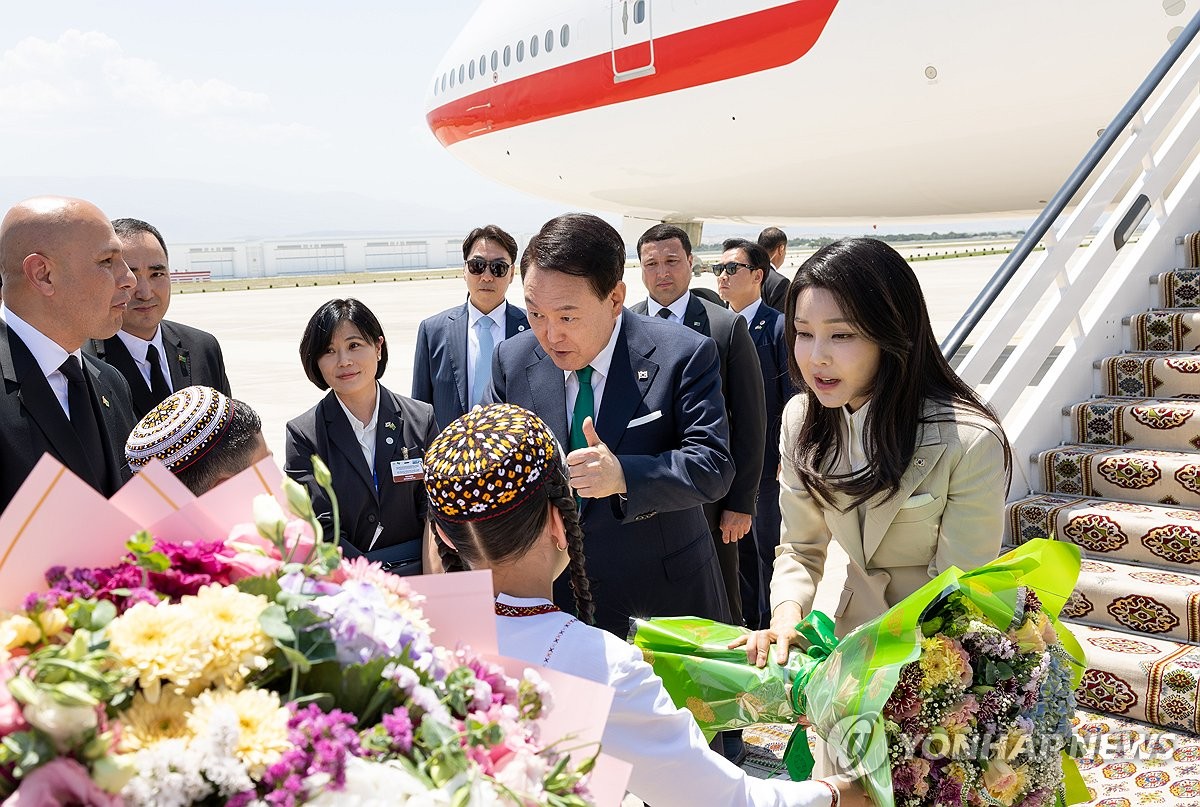By Kim Eun-jung
ASHGABAT, June 10 (Yonhap) — The leaders of South Korea and Turkmenistan agreed Monday to expand cooperation in large-scale energy and infrastructure projects, and work together for Seoul’s strategy for Central Asia.
President Yoon Suk Yeol held a summit with Turkmen President Serdar Berdimuhamedow in the capital city of Ashgabat and adopted a joint statement outlining their cooperation for Seoul’s “K-Silk Road Cooperation” initiative.
The initiative is the Yoon administration’s regional strategy centered on linking South Korea’s innovative capabilities with Central Asia’s resources and development potential.
During the talks, the two leaders agreed to deepen the “mutually beneficial partnership” in various areas, and discussed regional and international issues, Yoon’s office said.
Yoon and Berdimuhamedow also discussed ways to collaborate in the energy and infrastructure projects, and expand cooperation in new areas of mutual concerns, including infrastructure, shipbuilding, public health and climate change.
South Korea, the world’s fourth-largest buyer of crude and gas, aims to deepen collaboration for energy projects and resource development with Turkmenistan, the world’s fourth-largest natural gas reserve holder.
President Yoon Suk Yeol (2nd from R) and first lady Kim Keon Hee (R) receive bread and flowers from Turkmen children upon arrival at the Ashgabat International Airport in the Turkmen capital on June 10, 2024. (Pool photo) (Yonhap)
On the sidelines of the summit, the two sides signed the Trade and Investment Promotion Framework to pave the way for a comprehensive economic cooperation between the two nations, making it the third Central Asian country to clinch such a deal following Uzbekistan and Kazakhstan last year.
Hyundai Engineering Co. signed a framework agreement with Turkmenistan’s state-run Turkmengas for the fourth desulfurization facility at the Galkynysh gas field. It marks the Korean company’s second deal following an agreement in 2009.
Hyundai Engineering also inked a cooperation agreement with Turkmenistan’s state-run chemical corporation to resume operation of the Kiyanly Polymer Plant to manage the project’s first phase focused on a technical audit. The company secured a deal in 2013, but the plant ceased operations in 2023.
The talks also paved the way for Korean companies’ participation in urea and ammonia fertilizer production plants in Balkan Province, Kiyanly.
South Korea is seeking to diversify import sources of urea, a type of nitrogen used to curb emissions in diesel cars and to make agricultural fertilizers, amid growing concerns over its stable supply due to China’s tight export controls.
To help Korean companies bid on large-scale construction and plant projects in Turkmenistan, the two countries signed a memorandum of agreement on a financial cooperation framework and agreed to expedite talks on the Investment Protection Agreement and the Customs Mutual Assistance Agreement.
During the meeting, Berdimuhamedow supported South Korea’s launching a summit involving the leaders of South Korea and all five Central Asian countries, including Uzbekistan, Kazakhstan, Kyrgyzstan and Tajikistan, next year.
Yoon arrived in Turkmenistan on the first leg of his three-nation tour to Central Asia, which will also take him to Uzbekistan and Kazakhstan.
His state visit marks the third trip by a South Korean president to Turkmenistan, following visits in 2014 and 2019. The two countries established diplomatic relations in 1992 and forged a mutual partnership in 2008.
ejkim@yna.co.kr
(END)

